 | Samuel Hinds (bp. of Norwich.) - Logic - 1827 - 196 pages
...application of which every valid argument is, in reality, an instance, is, " that whatever is predicated (ie affirmed or denied) universally, of any class of things,...predicated, in like manner, (viz. affirmed or denied) of anything comprehended in that class." This is the principle, commonly called the dictum de omni et... | |
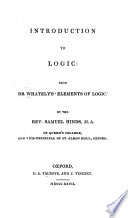 | Samuel Hinds (bp. of Norwich.) - Logic - 1827 - 190 pages
...application of which every valid argument is, in reality, an instance, is, " that whatever is predicated (ie affirmed or denied) universally, of any class of things,...predicated, in like manner, (viz. affirmed or denied) of anything comprehended in that class." This is the principle, commonly called the dictum de omni et... | |
 | Richard Whately - Logic - 1831 - 440 pages
...application of which, every valid argument is in reality an instance, is, " that whatever is predicated (ie affirmed or denied) universally, of any class of things,...class." This is the principle, commonly called the dictum de omni et nullo, for the establishment of which we are indebted to Aristotle, and which is... | |
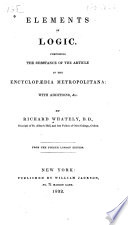 | Richard Whately - Logic - 1832 - 386 pages
...of which, every valid argument is in reality an instance, is, '• that whatever is predicated (ie affirmed or denied) universally, of any class of things,...class." This is the principle, commonly called the dictum de omni et nullo, for the establishment of which we are indebted to Aristotle, and which is... | |
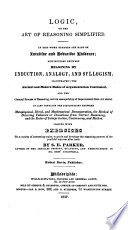 | S. E. Parker - Logic - 1837 - 344 pages
...of the syllogism, we are indebted to ARISTOTLE : it may be thus expressed. " Whatever is predicated, affirmed or denied, universally, of any class of things, may be predicated in like manner, affirmed or denied, of any thing comprehended in that class." As a frequent reference to this principle... | |
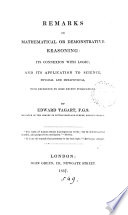 | Edward Tagart - Logic - 1837 - 156 pages
...of the true syllogism, he says there is this maxim resulting from it, " that whatever is predicated universally of any class of things, may be predicated in like manner of any thing comprehended in that class," — the celebrated principle called the dictum de omni et... | |
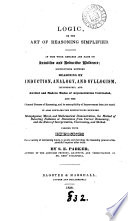 | S. E. PARKER - Logic - 1838 - 340 pages
...of the syllogism, we are indebted to ARISTOTLE : it may be thus expressed. " Whatever is predicated, affirmed or denied, universally, of any class of things, may be predicated in like manner, affirmed or denied, of any thing comprehended in that class." As a frequent reference to this principle... | |
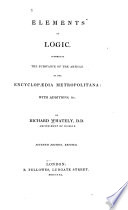 | Richard Whately - Logic - 1840 - 508 pages
...application of which, every valid argument is in reality an instance, is, " that whatever is predicated (ie affirmed or denied) universally, of any class of things,...class." This is the principle, commonly called the dictum de omni et nullo, for the establishment of which we are indebted to Aristotle, and which is... | |
 | Charles Morley - Literature - 1841 - 120 pages
...Conclusion; The sensualist is not a freeman. Extremes. Aristotle's rule. — Whatever is predicated, affirmed, or denied universally, of any class of things, may be predicated in like manner, affirmed or denied, of any thing comprehended in that class. SUMMARY OF FALLACIES IN ARGUMENT. GENUS... | |
 | Richard Whately - Logic - 1849 - 170 pages
...application of which every valid argument is in reality an instance, is, " that whatever is predicated (ie affirmed or denied) universally, of any class of things,...class." This is the principle, commonly called the dictum deomni & nullo, for the establishment of which we are indebted to Aristotle, and which is the... | |
| |